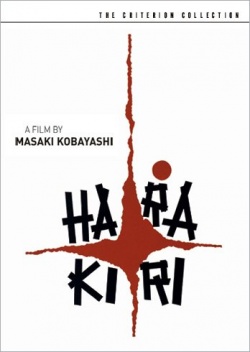
Harakiri
Description
Following the collapse of his clan, unemployed samurai Hanshiro Tsugumo (Tatsuya Nakadai) arrives at the manor of Lord Iyi, begging to commit ritual suicide on his property. Iyi’s clansmen, believing the desperate ronin is merely angling for charity, try to force him to eviscerate himself—but they have underestimated his honor and his past. Winner of the 1963 Cannes Film Festival’s Special Jury Prize, Masaki Kobayashi’s Harakiri is a scathing denouncement of feudal authority and hypocrisy.
Part Review from Film Reference http://www.filmreference.com/Films-Se-Sno/Seppuku.html
The recurrent image in Seppuku is of Tsugumo in his black robes (having refused the white ones appropriate to the ritual suicide), seated cross-legged on the white harakiri mat in the center of the courtyard, surrounded by the massed spears of the Iyi warriors, and speaking in calm, unhurried tones. Around this image of charged stillness, the action of the film proceeds through visual compositions of intense lyrical beauty: most notably in the duel between Tsugumo and Omadaka, finest of the Iyi swordsmen, breathtakingly staged as a formal ballet of stylized, sweeping gestures amid long wind-tossed grass. Kobayashi’s coolly reticent camera perfectly matches the rhythms of his studied narrative, supported by Toru Takemitsu’s evocative score and, in the central role, a performance of epic stature from Tatsuya Nakadai.
My Opinion
In my opinion this film is a masterpiece and equally as good as any Kurosawa film. I really cant praise this film enough, if you only see one Japanese classic by a master director try this one.
Country: Japanese
Status: completed
Released: 1962
Cast:
- Coming Eps
- Ongoing


